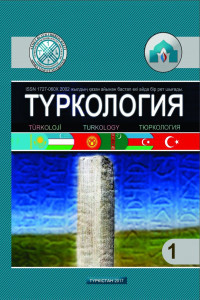ORTAÇAĞ DOĞU MÜSLÜMAN DÜŞÜNÜRLERININ KAMU BILINCINDE MUTLULUĞUN ROLÜ
THE ROLE OF HAPPINESS IN THE SOCIAL CONSCIOUSNESS OF MEDIEVAL EASTERN MUSLIM THINKERS
east, philosophy, man, meaning of life, Muslim, happiness, value, society, ethics,
___
- Delachieve. (n. d.). Adam ómiriniń máni men maǵynasy. adam ómiriniń máni nede? Adamnyń ómiri máseleniń maǵynasy [Meaning and meaning of human life. What is the meaning of human life? Human life - the meaning of the problem]. https://kk.delachieve.com/адам-өмірінің-мәні-мен-мағынасы-адам/
- Verhoef, A. (2018). Paul Ricoeur: Philosophy, theology and happiness. Stellenbosch Theological Journal, 4(2), 151-166 p.
- Asylov, U., & Nusqabaıuly, J. (2003). Ádeptaný: Adamgershilik qulyq sabaqtary [Etiquette: Lessons of moral behavior]. Almaty: Mektep, 288 b.
- Ál-Farabı. Tarıhı-fılosofıalyq traktattar [Al-Farabi. Historical and philosophical treatises]. (2006) Qazaq halqynyń fılosofıalyq murasy (4 t.). Jıyrma tomdyq. Ál-Farabı fılosofıasy. Astana: Aýdarma, 344-410 bb.
- Ál-Farabı. Fılosofıalyq kózqarastary [Al-Farabi. Philosophical views]. (1973). Ál-Farabı. Fılosofıalyq traktattar. Almaty: Ǵylym, 415 b.
- Ál-Farabı. Fılosofıalyq traktattar [Al-Farabi. Philosophical treatises]. (1973). Almaty: Ǵylym, 430 p. Dzhumabaev, Ju. D. (1975). Iz istorii jeticheskoj mysli v Srednej Azii (s drevnejshih vremen do Hv.) [From the history of ethical thought in Central Asia (from ancient times to the 10th century)]. Tashkent: Fan, 96 b.
- Zeıbek, K. (2003). Q.A. Iassaýı jáne tańdaýly hıkmetter [Yasawi and the Chosen Wisdom]. Ankara, 255 b.
- Karimova, M. R. (2009). Jeticheskie problemy v antropologii Ibn Siny [Ethical problems in the anthropology of Ibn Sina] (dis. kand. filos. nauk, In-t filosofii im. AM Bogoutdinova AN RT: 09.00.13). Dushanbe, 141 b.
- Karin, S. H. (1962). V mire mudryh myslej [In the world of wise thoughts] (3-e izd.). Moskva: Znanie, 360 b.
- Kasymzhanov, A.H., & Mazhidenova, D.M. (1990). Ocharovanie znanija [The Charm of Knowledge]. Frunze: Kyrgyzstan, 156 b.
- Qabylova, A.S. (1999). Ál-Farabıdiń fılosofıasyndaǵy mádenıetter sınteziniń orny [Place of synthesis of cultures in the philosophy of al-Farabi]. Almaty, 256 b.
- Maqataev, M. (1991). Úsh tomdyq shyǵarmalar [Works in three volumes]. (T.1: Óleńder men poemalar). Almaty: Jazýshy, 368 b.
- Mўminov, I. M. & Hajrullaev, M. M. (red.). (1972). Iz filosofskogo nasledija narodov Blizhnego i Srednego Vostoka [From the philosophical heritage of the peoples of the Near and Middle East]. Tashkent: Fan, 344-410 b.
- Nasımov, M. (2011, Maýsym 23). Ál-Farabı jáne saıasat ǵylymy [Al-Farabi and political science]. Abaı-aqparat. https://abai.kz/post/9143
- Nysanbaev, A. & Ábjanov, T. (1992). Adamǵa qaraı bet bursaq: ejelgi grek fılosofıasy týraly oı tolǵaýlary [Turning to Man: Reflections on Ancient Greek Philosophy]. Almaty: Qazaq ýnıversıteti, 160 b.
- Tórebaev, O. J. (2004). Balasaǵunnyń áleýmettik fılosofıasy [Social philosophy of Balasagun] (fılos. ǵyl. kand. dıss. avtoref.: 09.00.03). Almaty, 324 b.
- Haziret Sultan Ahmet Iassaýı. Hıkmetter [Hazrat Sultan Ahmet Yassawi. Wisdom.]. (2002). Almaty: Jibek joly, 268 b.
- Shadınova, G.A. (2009). Júsip Balasaǵunnyń fılosofıalyq kózqarasyndaǵy tanym máselesi [The problem of cognition in the philosophical approach of Yusup Balasagun]. (dıs. fılos. ǵyl. kan.: 09.00.03). Almaty, 120 b.
- ISSN: 1727-060X
- Başlangıç: 2002
- Yayıncı: Hoca Ahmet Yesevi Uluslararası Türk-Kazak Üniversitesi
İSKOÇ VE KAZAK TOPONIM EFSANELERININ KARŞILAŞTIRMALI ÇALIŞMASI
Assylbek MEİİRBEKOV, Arujan KURBAN
Taşkent begliğinin toprak mülkiyeti tarihinden (19. yüzyılın başı)
SON DÖNEM ÇAĞATAY YAZI DİLİNİN TEMSİLCİSİ NURMUHAMMED ANDELİB’İN KISSA-YI FİRʽAVN DESTANI
AVRUPA VE TÜRK DİLLERİNDE ADLANDIRMA: GÖKKUŞAĞI ÖRNEĞİ
ORTAÇAĞ DOĞU MÜSLÜMAN DÜŞÜNÜRLERININ KAMU BILINCINDE MUTLULUĞUN ROLÜ
TATARCADA Dİ- ‘DEMEK’ FİİLİ İLE KURULAN DELİLE DAYALILIK İŞARETLEYİCİLERİ
